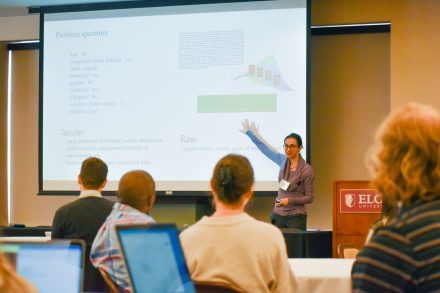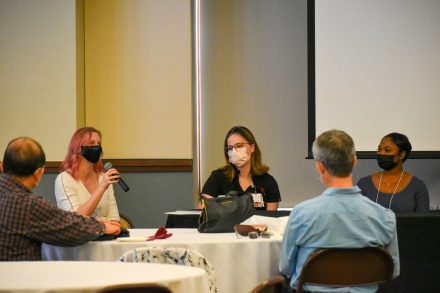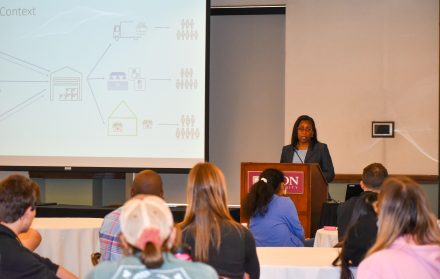The one-day event featured speakers from SAS Institute, Duke University, N.C. A&T State University, BNH.AI and The Redwoods Group.
What impact does analytics have in our society? How can traditional analytics and AI approaches be redesigned to enable responsible and transparent application to societal issues? How can analytics support social good?

These are just a few of the questions discussed during the 2022 Elon Analytics Day, hosted by the Center for Organizational Analytics.
Cynthia Rudin, director of the Interpretable Machine Learning Lab at Duke University and recipient of the 2022 Squirrel AI Award for Artificial Intelligence for the Benefit of Humanity and 2022 Guggenheim Foundation Fellowship, kicked off the event sharing how the lack of transparency in machine learning models used in the decision-making processes can have serious societal consequences.
Providing specific real examples, Rudin showed how using black box models, which are very complex and opaque, in combination with typographical errors in human-entered input, can result in flawed parole decisions and show bias. Black box models are also proprietary, which raises the issue of trust, particularly when accountability and transparency are needed in decision-making processes impacting human lives.
When it comes to high-stakes decisions in domains such as criminal justice and healthcare, Rudin recommends using models that allow humans to interpret the results and immediately detect obvious errors. Her research has established that in most instances of these societal contexts, transparent models are not less accurate than traditional black box models.
As examples of effective and transparent scoring models, Rudin shared optimized scoring system models that her lab has designed for medical applications, enabling doctors to better interpret patient data to diagnose certain conditions. These scoring systems are simple and accessible, and easily interpreted and applied by medical experts. Their optimal accuracy is ensured by a complex machine learning algorithm that does not need to be understood by medical experts. Rudin’s pioneering work has shown that it is indeed possible to combine transparency, interpretability – which is important for societal applications – with high predictive accuracy and technical fidelity.
Patrick Hall, principal scientist at BNH.AI, echoed the need for transparency and accountability in his session on fairness, governance and the future of AI. Hall, who is a co-author of a National Institute of Standards and Technology paper on this topic, noted there are serious risks with AI, such as algorithm discrimination and data bias, lack of transparency and accountability, and data privacy problems. These risks can lead to serious harm, which is often concentrated on marginal groups and people who lack fundamental access to the internet and therefore do not even appear in data.
Hall’s advice on how to address these problems lies with the need to govern the people who create AI and computer software. “You cannot govern the software because it is an inanimate object,” he said. “You need to govern the creators of the software.” He suggests there should be incentives for AI fairness and serious legal consequences when there is harm done due to misuse and avoidable biases in AI models.

Presenters also shared examples of how analytics can help nonprofit organizations optimize their limited resources while achieving their goals. Natalia Summerville, who leads a team of data science practitioners within the Advanced Analytics Center of Excellence at SAS Institute, shared four prescriptive analytics applications that helped:
- Identify where to open new drop off locations to minimize shipping costs for Wake Med Mothers’ Milk Bank
- Find the best schedule and room assignments for Durham Public Schools to maximize face-to-face time and minimize room changes while considering Covid-19 restrictions
- Generate an optimal reopening plan for Cleveland Clinic that balances hospital economics, efficient use of resources and clinical care quality
- Assign routes for Boston Public Schools that maximize the number of routes per package while minimizing transfers.
Optimization and prescriptive analytics provide a “smart way of coming up with the best solution without necessarily having to enumerate all possible solutions,” Summerville said.
In looking at how analytics can be applied in hunger relief supply chains, Lauren Davis, professor in the Department of Industrial & Systems Engineering at North Carolina Agricultural and Technical State University, presented predictive and descriptive models to quantify the availability of supply over time, characterize demand, and optimize the distribution of uncertain supply to ensure equity and improve food access. She used data from a local nonprofit hunger relief organization and took into consideration the distinguishing features of the hunger relief supply chains – uncertain supply, varying shelf life, volunteer resources, storage capacity, balance equity, efficiency, effectiveness, and uncertain demand.

Davis noted the management of donated food supply in non-profit food distribution is challenging, and the pandemic added more challenges, such as increased demand and fewer donations due to food supply chain shortages.
In the executive wrap-up, Kevin Trapani, founder and CEO of The Redwoods Group and Love School of Business executive-in-residence, encouraged the audience to:
- Do important work that creates a more equitable society
- Do this work well, and use data analytics to prove that the work is done in an equitable fashion and at a high efficacy, which is important for long-term business health.
- Do the work at a scale that is adequate to address the problem, keeping in mind that such scalable solutions must be data informed.
“Elon Analytics Day provided a wonderful opportunity for students, faculty and the larger community to learn from prominent leaders in the field of analytics about what is involved in applying analytics or AI to decisions that have a human impact,” said Manoj Chari, director of the Center for Organizational Analytics and assistant professor of management information systems. “Like any other technological or scientific innovation, analytics and AI can make great contributions to the solution of societal problems, but its ill-considered and careless use, even with the best of intentions, can cause harm to individuals lives and can perpetuate historical biases and inequities. The presentations during the Analytics Day conference shed light on both of these important aspects of Analytics applications to society, while highlighting related analytical, legal and ethical issues that are subjects of current research and debate.”


